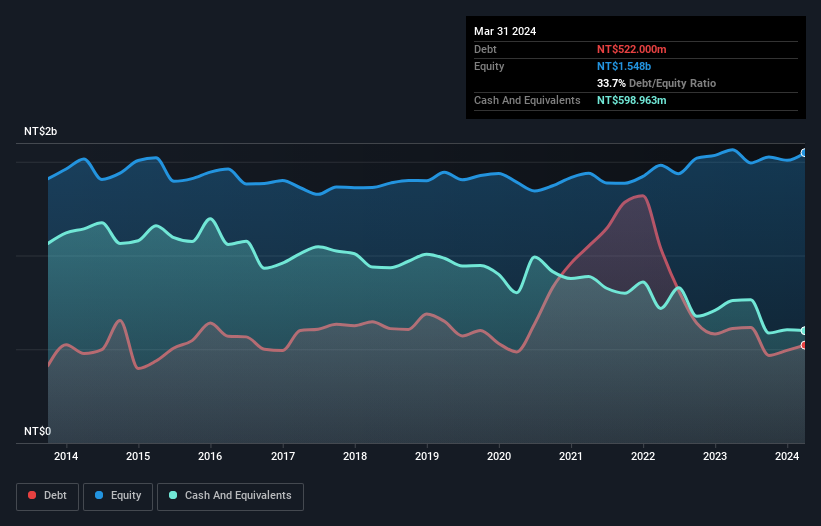- Taiwan
- /
- Electronic Equipment and Components
- /
- TWSE:6155
Is King Core Electronics (TWSE:6155) Using Too Much Debt?
David Iben put it well when he said, 'Volatility is not a risk we care about. What we care about is avoiding the permanent loss of capital.' So it seems the smart money knows that debt - which is usually involved in bankruptcies - is a very important factor, when you assess how risky a company is. As with many other companies King Core Electronics Inc. (TWSE:6155) makes use of debt. But the more important question is: how much risk is that debt creating?
When Is Debt Dangerous?
Debt and other liabilities become risky for a business when it cannot easily fulfill those obligations, either with free cash flow or by raising capital at an attractive price. Ultimately, if the company can't fulfill its legal obligations to repay debt, shareholders could walk away with nothing. However, a more usual (but still expensive) situation is where a company must dilute shareholders at a cheap share price simply to get debt under control. By replacing dilution, though, debt can be an extremely good tool for businesses that need capital to invest in growth at high rates of return. The first thing to do when considering how much debt a business uses is to look at its cash and debt together.
Check out our latest analysis for King Core Electronics
What Is King Core Electronics's Debt?
The image below, which you can click on for greater detail, shows that King Core Electronics had debt of NT$522.0m at the end of March 2024, a reduction from NT$611.0m over a year. However, its balance sheet shows it holds NT$599.0m in cash, so it actually has NT$77.0m net cash.

How Strong Is King Core Electronics' Balance Sheet?
We can see from the most recent balance sheet that King Core Electronics had liabilities of NT$625.5m falling due within a year, and liabilities of NT$17.9m due beyond that. On the other hand, it had cash of NT$599.0m and NT$166.7m worth of receivables due within a year. So it can boast NT$122.3m more liquid assets than total liabilities.
This surplus suggests that King Core Electronics has a conservative balance sheet, and could probably eliminate its debt without much difficulty. Simply put, the fact that King Core Electronics has more cash than debt is arguably a good indication that it can manage its debt safely. When analysing debt levels, the balance sheet is the obvious place to start. But it is King Core Electronics's earnings that will influence how the balance sheet holds up in the future. So if you're keen to discover more about its earnings, it might be worth checking out this graph of its long term earnings trend.
In the last year King Core Electronics had a loss before interest and tax, and actually shrunk its revenue by 28%, to NT$520m. To be frank that doesn't bode well.
So How Risky Is King Core Electronics?
While King Core Electronics lost money on an earnings before interest and tax (EBIT) level, it actually booked a paper profit of NT$82m. So when you consider it has net cash, along with the statutory profit, the stock probably isn't as risky as it might seem, at least in the short term. We'll feel more comfortable with the stock once EBIT is positive, given the lacklustre revenue growth. There's no doubt that we learn most about debt from the balance sheet. But ultimately, every company can contain risks that exist outside of the balance sheet. To that end, you should learn about the 2 warning signs we've spotted with King Core Electronics (including 1 which doesn't sit too well with us) .
If you're interested in investing in businesses that can grow profits without the burden of debt, then check out this free list of growing businesses that have net cash on the balance sheet.
Valuation is complex, but we're here to simplify it.
Discover if King Core Electronics might be undervalued or overvalued with our detailed analysis, featuring fair value estimates, potential risks, dividends, insider trades, and its financial condition.
Access Free AnalysisHave feedback on this article? Concerned about the content? Get in touch with us directly. Alternatively, email editorial-team (at) simplywallst.com.
This article by Simply Wall St is general in nature. We provide commentary based on historical data and analyst forecasts only using an unbiased methodology and our articles are not intended to be financial advice. It does not constitute a recommendation to buy or sell any stock, and does not take account of your objectives, or your financial situation. We aim to bring you long-term focused analysis driven by fundamental data. Note that our analysis may not factor in the latest price-sensitive company announcements or qualitative material. Simply Wall St has no position in any stocks mentioned.
About TWSE:6155
King Core Electronics
Manufactures and sells EMI, power, and RF application products China, Taiwan, and internationally.
Excellent balance sheet with questionable track record.
Similar Companies
Market Insights
Weekly Picks


Ferrari's Intrinsic and Historical Valuation


Investment Thesis: Costco Wholesale (COST)

Undervalued Key Player in Magnets/Rare Earth
Recently Updated Narratives

Salesforce's Market Dominance and AI Pivot Will Drive Earnings Re-acceleration


IREN's Trump Card: How Federal Policy Could Unlock Massive Value in AI Infrastructure


ESPN’s NFL Power Play: How Disney’s Sports Engine Could Drive the Next Leg of Stock Growth
Popular Narratives


The "Sleeping Giant" Stumbles, Then Wakes Up


NVDA: Expanding AI Demand Will Drive Major Data Center Investments Through 2026

Undervalued Key Player in Magnets/Rare Earth
Trending Discussion


I'm exiting the positions at great return! WRLG got great competent management. But, 100k oz gold too small in today environment. They might looking for M/A opportunity in the future, or they might get take over by Aris Mining, I don't know. But, Frank Giustra stated he's believed in multi-assets, so that's my speculation. Anyhow, I want to be aggressive in today's gold price. I'm buying Lahontan Gold LG with this as exchange. Higher upside, more leverage. WRLG CEO is BOD's of LG, that's something. This will be my last update on WRLG, good luck!





